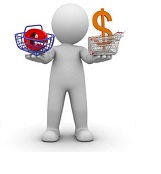“Thus, in the future, instead of buying bananas in a grocery store, you could go pick them off a tree in a virtual jungle!”- Yasuhiro Fukushima, Enix Corporation.
Take your time, but GET IT RIGHT!
Broadly speaking, there are two types of entrepreneurs who take a plunge into the stream of e-commerce, one who follow their passion and the other who are fine with selling anything as long as it is profitable. Unless you have the resources and abilities to sell everything under the sun and compete with key players like Amazon and e-bay, you need to devote considerable effort, research and time in order to identify your e-commerce niche. The key to finding out what you need to sell lies in the middle-path between passion and profits, and once again, there are guidelines and norms but no formulaic designs for success.
Streamline your passion for commercial success!
If you have a passion and want to pursue it in the form of an e-commerce venture! But in order to be successful and make money, your passion needs to be backed by strong business acumen. For instance, if you are a voracious reader and want to sell books online, figure out how you will attract people to purchase books from you as opposed to buying from existing e-commerce giants. Will you focus on a specific genre or do you have a unique merchant tie-up to offer attractive discounts? Which market segment should you focus on for maximum profitability? Ask yourself as many questions as possible to come to a conclusion whether your business proposal is economically viable or not.
Analyzing all possible perspectives to hit the bull’s eye!
We have compiled a list of different perspectives to help you analyze before narrowing down on what you intend to sell online:
- Consider the fragility, perishability and breakage potential of your product, especially during transit. Also consider the shelf life or durability of the product, the inventory levels that you would be required to maintain, and the potential risk of storing the product.
- It is advised that you refrain from trying to sell what is easily available in departmental stores or neighborhood shops, unless you have a very good reason why people will prefer to buy it from you online.
- It might happen so that what is easily available in your neighborhood or city is hard to find in other geographical areas. For instance, if there is an intricate wood-work handicrafts industry thriving in your city or town, the same quality will be hard to come by in other cities, and you can consider selling the same online.
- An important rule of thumb that always works: Do not sell what everyone else is selling. The lesser your competition, the more likely you are to make profits faster as a start-up business.
- Try to identify a product that you can easily and economically source in order to simplify your procurement and operational hassles.
- Instead of being at the mercy of one supplier for you product, turn it the other way around, so that you are able to offer alluring discounts to your end-users.
- Analyze the profit margin of each product in the list of product options that you are considering. It is advisable that you sell a few products with a high profit margin, rather than selling larger numbers of low-margin products. Calculate the cost of establishing and maintaining your e-commerce platform plus inventory handling expenses, shipping charges etc. The profit margin of the product that you intend to sell should help you break even within a reasonable time period.
- Steer clear of products that get outdated quickly, else you might get stuck with unnecessary dead stock.
- Identify your target market segment and focus on their key problems. If you are able to provide them the apt solution for a key problem at a price that they can afford, you have better chances of being successful. For example, selling organic food products (which are relatively expensive) with attractive discounts will definitely attract health enthusiasts, as many people generally do not purchase the same because of the price constraint.
- It is always better to start by selling a small range of products, gain better understanding, and gradually expand or diversify your offerings.
Conclusion: With thousand of e-commerce stores opening every day, you have to be doubly sure that there is a market for your product. Don’t expect an exponential sales chart in the beginning itself, and most importantly take your time to decide on the crucial aspects. Results will always unfold gradually and patience is the key to your success in this realm.



Add Comment